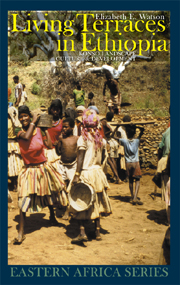Book contents
- Frontmatter
- Contents
- List of Photographs
- List of Maps, Tables & Figures
- Acknowledgements
- Foreword
- Introduction: Konso Landscape, Culture & Development
- 1 Konso Intensive Indigenous Agriculture
- 2 Social Life of Agriculture
- 3 Ritual Life of Agriculture
- 4 Political Life of Agriculture
- 5 Modernity & Christianity
- 6 Revolutionary State
- 7 Ethnic Decentralization & Self-determination
- Conclusion: Landscape, Meaning & Development
- References
- Index
2 - Social Life of Agriculture
Published online by Cambridge University Press: 12 September 2012
- Frontmatter
- Contents
- List of Photographs
- List of Maps, Tables & Figures
- Acknowledgements
- Foreword
- Introduction: Konso Landscape, Culture & Development
- 1 Konso Intensive Indigenous Agriculture
- 2 Social Life of Agriculture
- 3 Ritual Life of Agriculture
- 4 Political Life of Agriculture
- 5 Modernity & Christianity
- 6 Revolutionary State
- 7 Ethnic Decentralization & Self-determination
- Conclusion: Landscape, Meaning & Development
- References
- Index
Summary
The customary agricultural practices and institutions that are described in this Part of the book are those practices and power relations whose legitimacy is grounded in the claims to tradition, to the ways things have always been and should be. Using Bourdieu's terms, this represents the orthodoxy in Konso. The title of this specific chapter is borrowed and developed from Appadurai's edited book, The Social Life of Things (1986). Others have taken up his approach before now, for example Nyerges (1997) uses his ideas to talk about ‘the social life of resources’, and Longley (2001) uses his ideas to talk about ‘the social life of seeds’. For these authors, Appadurai's approach to things is useful because it sees them not as inert, but as objects with ‘careers’, ‘life histories’ and ‘biographies’, which are ‘fully part of social life’ (Nyerges, 1997: 12). Thus the environment is presented not merely as a backdrop to social life, but as deeply inter-connected with, and part of, that social life. This approach has therefore much in common with the approach to agriculture as a social process discussed in the introduction. In the next chapter, the approach is taken further to show that not only are the practices and institutions part of social life, they are also part of ritual life. The title the ‘Ritual Life of Agriculture’ is used to show that these social processes are also cultural processes too, replete with ritual actions, relationships and meanings.
- Type
- Chapter
- Information
- Living Terraces in EthiopiaKonso Landscape, Culture and Development, pp. 54 - 79Publisher: Boydell & BrewerPrint publication year: 2009



